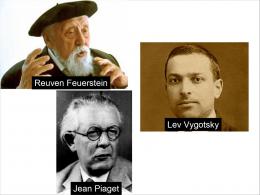Theoretical Basis

The Basic Concepts Programme© (BCP) is underpinned by contemporary cognitive educational theory. The BCP draws on the interrelated ideas of three psychological theorists concerning development and learning, namely Jean Piaget, Lev Vygotsky and Reuven Feuerstein. All three theorists placed emphasis on the primacy of cognition in development, however they also acknowledged the role played by the social environment. While Piaget’s work could be regarded as the blueprint for Cognitive Psychology, the work of Feuerstein and Vygotsky went further to encompass socio-cultural aspects of learning and development. The work of Feuerstein and Vygotsky also provided a more optimistic outlook on learning and development than that proposed by Piaget; that learners given appropriate mediation can advance beyond what they already know. This belief in the ability of all children to learn is a central tenet of the BCP.
The human organism has the unique capacity to adapt and modify itself in a variety of cognitive and motivational functions and to adapt to changes within the environment, despite the etiology, age and severity of its condition.
(Reuven Feuerstein, 1984)

